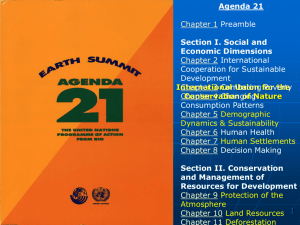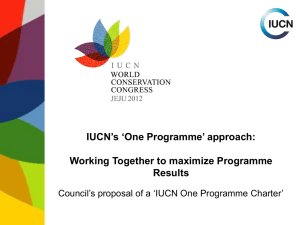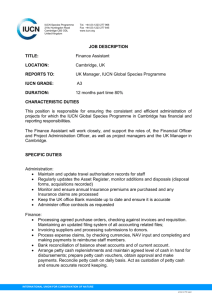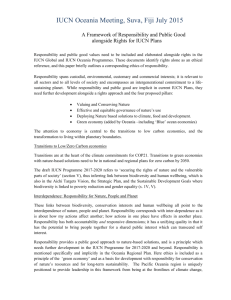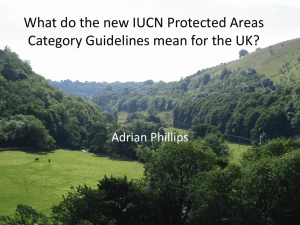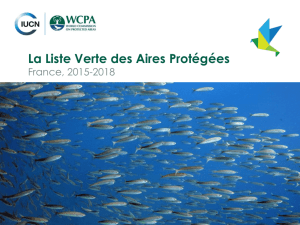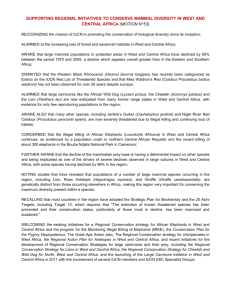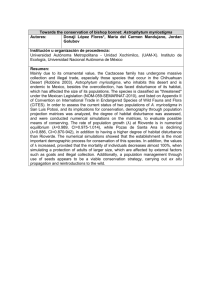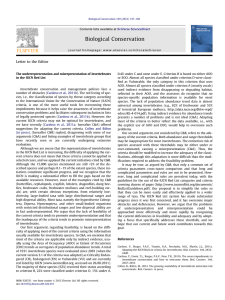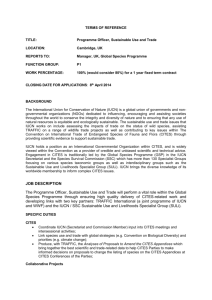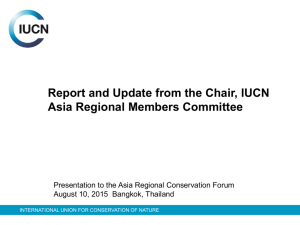General Workshop Information
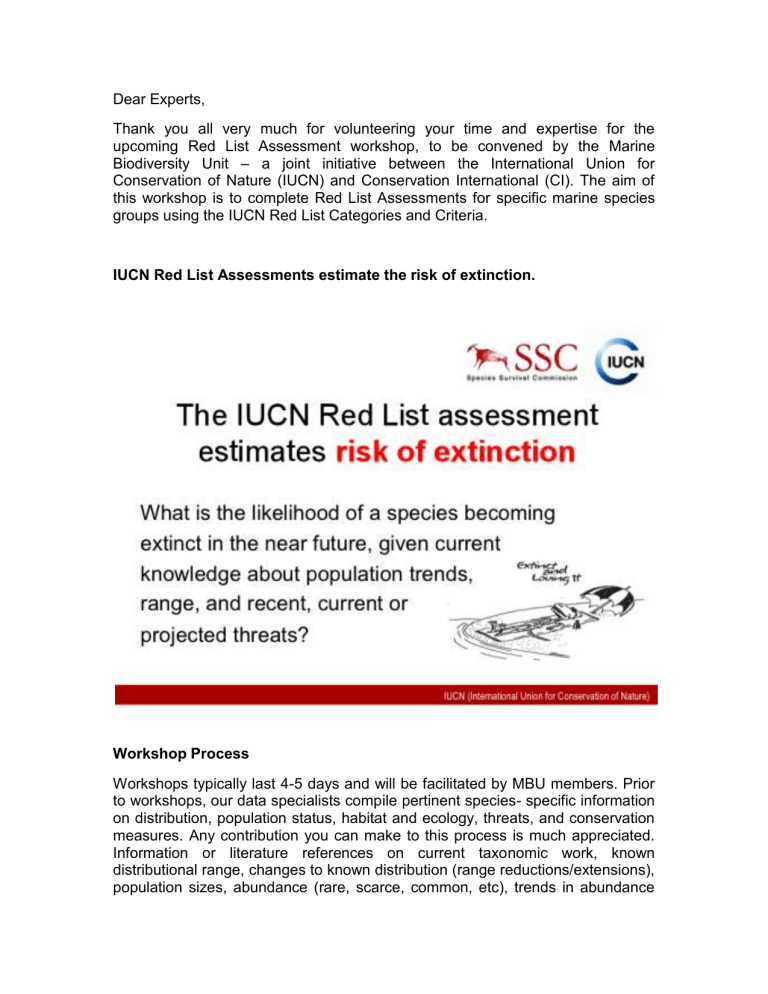
Dear Experts,
Thank you all very much for volunteering your time and expertise for the upcoming Red List Assessment workshop, to be convened by the Marine
Biodiversity Unit
– a joint initiative between the International Union for
Conservation of Nature (IUCN) and Conservation International (CI). The aim of this workshop is to complete Red List Assessments for specific marine species groups using the IUCN Red List Categories and Criteria.
IUCN Red List Assessments estimate the risk of extinction.
Workshop Process
Workshops typically last 4-5 days and will be facilitated by MBU members. Prior to workshops, our data specialists compile pertinent species- specific information on distribution, population status, habitat and ecology, threats, and conservation measures. Any contribution you can make to this process is much appreciated.
Information or literature references on current taxonomic work, known distributional range, changes to known distribution (range reductions/extensions), population sizes, abundance (rare, scarce, common, etc), trends in abundance
over time, for exploited species, estimates of catch per unit effort (CPUE), survey or transect data, life history information, specific habitat requirements, prevailing threats, known conservation measures (in existence or in review), would be particularly valuable. Our GIS team will generate the distribution maps for each species. We try our best to make the species accounts as comprehensive and carefully prepared as possible, however, it is also highly likely that we will be unable to add all the available relevant information to the species database, any information that you can bring to the workshop in digital (e.g. pdf or other) format for discussion is of great value to us and to the workshop.
In some (exotic) workshop locations, Internet may not be available, please have all of your workshop materials ready prior to coming to the workshop.
Attached are several important documents for the upcoming Red List workshop:
IUCN Red List Categories and Criteria and a summary to applying the
Categories and Criteria. Please note that we will be giving an in-depth presentation on the Red List Categories and Criteria on the first day of the workshop.
During the workshop
At the workshop, participants will work in groups to complete species assessments. We will be using the IUCN Species Information System database to review each species account and to add additional information gathered at these sessions. Upon reviewing all pertinent information for each species, the group will then select the appropriate assessment category and the criteria that may apply to the species. It is important that we justify why the species has been assigned to the particular category. The purpose of the rationale is to act as a concise stand-alone summary, briefly summarizing the main evidence, i.e., like an abstract for the whole species assessment. See attached for a sample Red
List rationale.
Please see below for details on the type of information required for species assessments.
Types of information required for each assessment
Distribution: It is important that we have information to refine the map for each species that reflects its current extent of occurrence. It will also be useful if you know if there is a changing trend in the species distribution (is it increasing, has it disappeared from various locations?).
Population: This is a category where the knowledge the experts can contribute is vital. We need to know information about the current population trends for the species during the assessment. This information can come from direct
observation (the experts have been surveying an area and have seen that the species is recovering/declining in the area), indices of abundance (relative abundance of any species at any location is important information, this often comes from field surveys), knowledge of exploitation, knowledge of diseases/competitors/predators, and proxies such as known changes in a species that it co-occurs with or known habitat destruction.
Habitat and Ecology: This is general knowledge of the species. It includes information about the life history, preferred habitat types (e.g., depth range, substrate type) and generation length.
Threats: In order to determine the likely future trend for the species it is useful to know what the past, present, and predicted future threats to the species are.
These come from many categories including human impacts, changes in species dynamics, and intrinsic problems for the species. This should also include a list of things that the species is used for by humans, although they don’t necessarily need to be a threat.
Conservation measures: Finally, it is necessary to determine what conservation measures are currently in place and what measures should be taken, if any, for the future preservation of the species (to be implemented in the next 5 years).
After the workshop
The post-workshop process involves outside consultation and follow-up with experts on the marine species group assessed, when additional information is needed but not available at the workshop. After the species accounts are edited by MBU members, the accounts will be sent out for independent review by at least two evaluators assigned by leaders of the Species Specialist Groups/Red
List Authorities, or experts that have been deemed suitable by participants at the workshop. Once all species accounts have been reviewed, MBU will finalize the accounts and conduct consistency checks for all species. Once the postworkshop process has been completed, the accounts will then be sent to the
IUCN Red List Unit for publication online on the Red List
( http://www.iucnredlist.org/ ).
Logistical Information
The MBU will cover all costs of travel, accommodation and food for each participant while at the workshop.
Travel Arrangements
We typically contact our travel agent to arrange for flights. Attached is a participant travel information document that you would need to fill out so we can send your travel preferences to our travel agent. If you opt to pay for your travels, we can reimburse your expenses after you send us the invoice of your travel
arrangements. We also reimburse fuel fees, bus/train, taxis
– any form transportation to and from the workshop. Please note that as a rule, IUCN can only pay for economy class tickets.
Visa Services
The MBU will cover costs for visa services, should there be a requirement for selected workshop locations. MBU members in charge of workshop preparations will coordinate visa arrangements prior to the workshops.
Reimbursement process
For participants that need to file reimbursement claims for internal travel costs, please send a copy of your invoice and any numbered, scanned receipts, along with the IUCN expense claim form (attached below). Please make sure to provide current address and banking information (we will reimburse by direct deposit in USD, AUD and CHF).
Thank you very much for your attention. We appreciate your assistance and look forward to meeting you all at the workshop. Should you have any questions regarding the upcoming Red List workshop or the Red Listing Process, please contact:
Beth Polidoro
Heather Harwell
Mia Comeros
